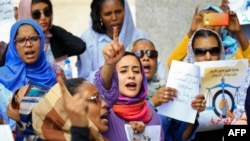The number of cases of domestic violence against women and girls has increased during the COVID-19 lockdown in the Sudanese capital Khartoum, according to officials.
Sulaim Al Khalifa, head of Sudan’s gender department at the Social Welfare Ministry, said her office documented 42 incidents of gender-based violence, including rapes and beatings of women and girls in Khartoum and other towns across Sudan over the past month.
“The cases are coming from all over Sudan, but mostly cases around Khartoum, and most are domestic violence and types of abuses, physical abuses. There are cases of imprisonment that people are tied up and imprisoned, and we know that there are other cases that have not reached [out] for the services,” Al Khalifa told South Sudan in Focus.
Under former President Omar Al Bashir’s 30-year rule, there were no laws to protect women and girls, a situation that Al Khalifa said exposed them to abuse within their families.
Although officials in the social welfare ministry have advocated for the rights of women, Al Khalifa said the absence of laws making physical abuse a crime hampers their efforts to combat gender-based violence.
“We don’t have a gender-based law and we don’t have a law that criminalizes domestic violence. That is why when we are working with survivors, we advocate and support by our presence, especially cases related to early marriage, because there is a lot of domestic violence happening within [the] early marriage process,” Al Khalifa said.
The ministry introduced a hotline to provide psychological and social support to domestic violence survivors during the COVID-19 lockdown, which Al Khalifa said is aimed at helping wives and daughters who are being abused.
“How to solve your problems within families, and how people could get use of this time of staying home, getting to know each other, solving their problems. Trying to get this positive aspect but also to address and talk about the negative aspect of the high rate of domestic violence happening in our society,” Al Khalifa said.
She said the social service ministry is working with local and International NGOs to draft a bill that would address the problem of domestic violence “that also includes safe houses, to train police, the special judiciary and everything.”
In the meantime, she encouraged all family members to take full responsibly for the protection of women and girls within their communities.





